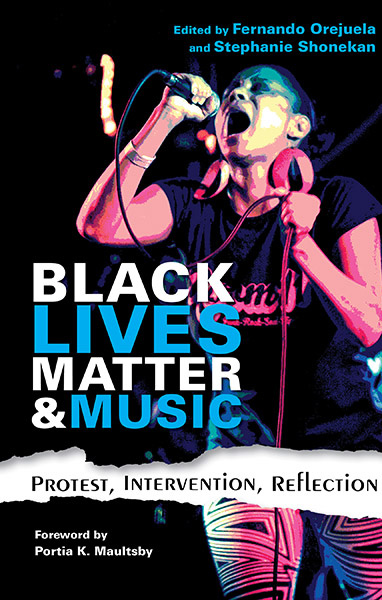“Hope,” writes Fernando Orejuela, Senior lecturer at IU Bloomington’s department of Folklore and Ethnomusicology, “hope and some modicum of healing.” This was the motive behind the work of five IU Folklore and Ethnomusicology Alumni, Fernando Orejueala, Stephanie Shonekan, Alison Martin, Langston Collin Wilkins, and Denise Dalphond, as they packed each page they were alotted with perspective. The forward was written by Portia K. Maultsby, Emerita Professor of Ethnomusicology. Black Lives Matter and Music: Protest, Intervention, Reflection, dives into perhaps the deepest illness of our nation, and searches for medicinal patterns in the music of young people of color. Each contributor put their pen to protest, and to present conversations about institutional racism, class hierarchies, and cultural hegemony, and explain that such conversations are necessary to sustain all the time and not just in waves. They hope to support the efforts in the streets, but also to explore what else they as scholars can do to make some difference. Orejuela shared one possibible impact: “Maybe there is one chapter here that will make one person re-evaluate their position on the events we describe a little or a lot differently. Or inspire someone to write or do work that we were unable to address in the few pages we were allotted that will make change happen.”
Shonekan shares the outlook of hope, writing, “I look forward to an academic community devoid of the -isms that plague us inside and outside the Ivory Tower.” Their work has made its rounds, as more and more wish to hear them speak on it’s contents. Shonekan writes of the recognition, “We know we are on the right track when peers and others recognize our contributions to the field.’
Alison Martin brought insight about what it was like to work with fellow alumni, saying “I really enjoyed the process of writing my chapter for the book, I had great feedback from both Stephanie and Fernando. I became an ethnomusicologist to do this kind of critical work, so it’s great to have an opportunity to do so in my own department.”
The work is definitely an achievement, as it draws from both ethnographic research and personal experience to discuss black struggle, liberation, and identity through music. The book was printed by Indiana University Press, and is available now.

 The College of Arts
The College of Arts